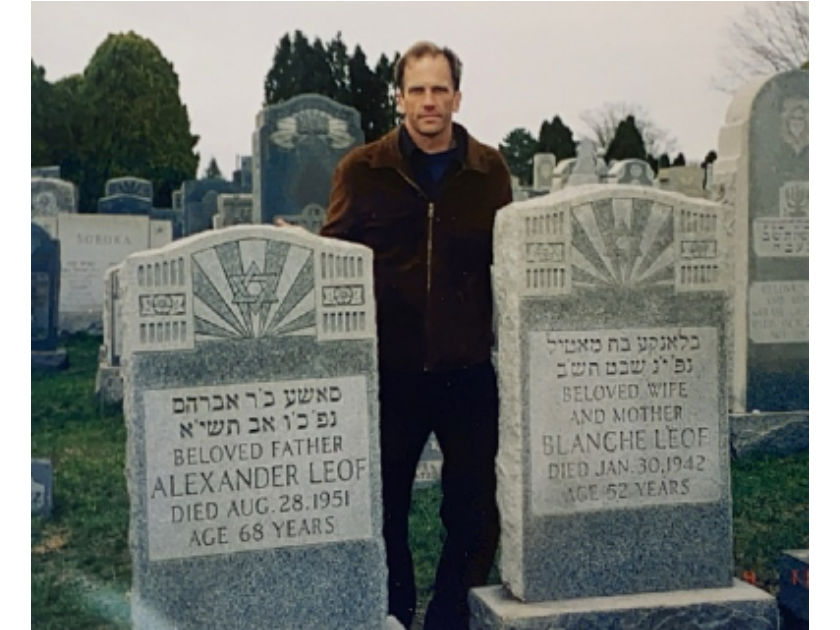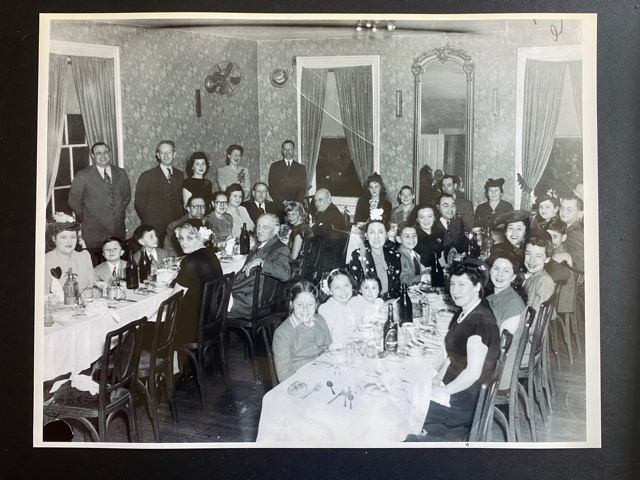
Author at the graves of his great grandfather and great grandmother
My Armenian grandfather, JK, was married to an Armenian woman named Haganoush, who discovered she couldn’t have children. For JK, not having a male heir was completely unacceptable. But Haganoush had been brought to Philadelphia from the Republic of Armenia as part of an arranged marriage in 1921, six years after the start of the Armenian genocide, and divorcing a survivor like her was also completely unacceptable.
So instead, my grandfather played around while his wife looked the other way. In the mid-1930s, JK met a woman named Shirley Livshitz at a Jewish dance. He told her he was single and Jewish. Both monumental lies. She was a beauty and no doubt captivated him, at least temporarily. When she became pregnant, JK sent her to live in a boarding house so no one would find out and agreed to support her financially.
This was almost certainly because the resulting child, my uncle Jack, was a boy. If he had been a girl, I feel sure that JK wouldn’t have supported his second family. Indeed, when my grandmother — my biological one — gave birth to the sons JK wanted, first Jack and then my father, Bob, his financial support came with a condition: They had to be raised as Christians. They were to learn nothing of their Jewish ancestry, culture, or traditions. And since my uncle and my father could have no contact with the Armenian side of their family — lest JK’s secret be exposed — they also learned little of their Armenian heritage.
So even though my father and my uncle belonged to groups affected by two of the worst genocides of the twentieth century, they knew almost nothing about their connection to either one because their father had birthed them into a false familial history.
Could I ever in my life tell a bigger lie than that?
Well, no.
But not for lack of trying.
________
My book, RUSE: Lying the American Dream from Hollywood to Wall Street, details my career as (arguably) the world’s #1 corporate spy — but it also illuminates the way the past influences the present which then changes the future. Even before the publication of RUSE, I’d done extensive genealogical research on my Jewish roots. But the Russian invasion of Ukraine really made me consider this aspect of my heritage since my Jewish ancestors came from the small village of Vinnitsya, less than two hundred miles from Kyiv. And, like Ukrainian President Zelensky, I am a quarter Jewish.

Author’s grandmother, father, and uncle at a family Bar Mitzvah in 1945
I thought of the old pictures I’d been sent by my Jewish relatives, none of whom I’d ever met or spoken to before my research. Yet they were all willing to share with me not only the photos but, more importantly, the stories of our shared history. I received photos of my great grandfather, Alexander “Sasha” Livshitz, and one of my great grandmother, Blanca Goldsman. I learned that Blanca’s grandfather was called Morton. Was that why my father’s middle name was Martin? A middle name I’d inherited, too, since I am a junior. There was no Martin anywhere else in our family, so my name — at least one of them — seems to be Jewish.
From census records, I learned that Blanca lived with my grandmother, Shirley, when my father and uncle were small children. A Jewish friend said it was highly likely she spoke Yiddish to her grandchildren when she tucked them in at night since she had come from “the old country.” Unfortunately, Blanca died before they were old enough to retain any memory of her.
But the most interesting artifact I was given was a photo of my father and his brother as young boys at the Bar Mitzvah of their older cousin in 1945. I imagine my grandmother had to hide their attendance from my grandfather, JK. In the picture she sits at the far-left corner of the frame looking nervous as if perhaps the photo would become evidence of her violation of the pact they’d made. While my father and uncle were never allowed to be Bar Mitzvahed — nor were they allowed to go to temple — for this one day they were part of Jewish tradition and surrounded by relatives they would never see again. Our Jewish heritage seemed to end there until more than fifty years later when my brother fell in love with and married a Jewish woman. Today, their three children are being raised in the Jewish faith.
Somewhere my great grandmother is whispering bashert.
Robert Kerbeck is the founder of the Malibu Writers Circle and his essays and short stories have been featured in numerous magazines and literary journals, including Narratively, Cimarron Review and Los Angeles Magazine. His short story, “Reconnected”, was adapted into an award-winning film and has appeared at film festivals worldwide. He is a lifetime member of The Actors Studio and an award-winning actor. He is also the author of Malibu Burning: The Real Story Behind LA’s Most Devastating Wildfire.